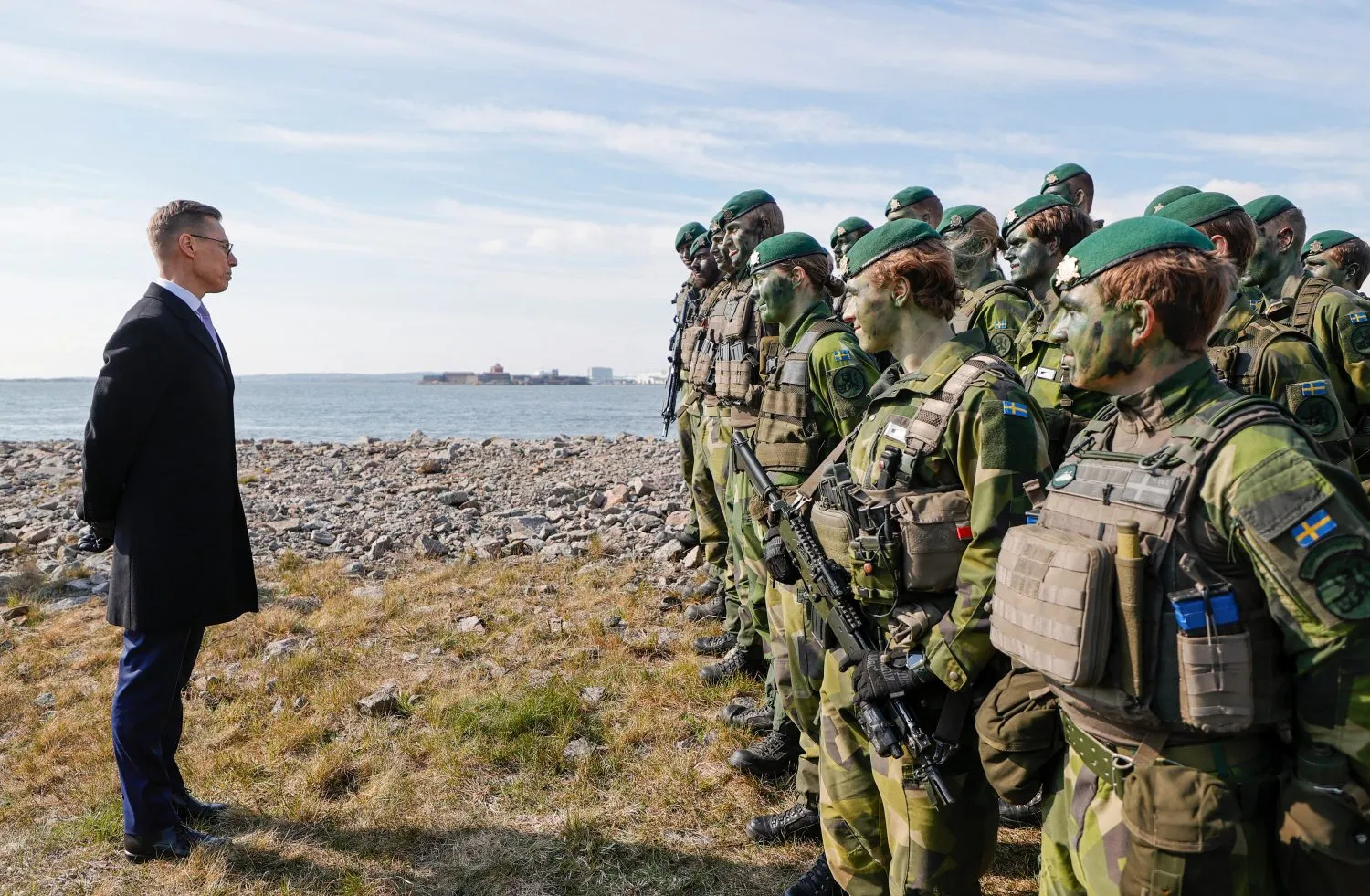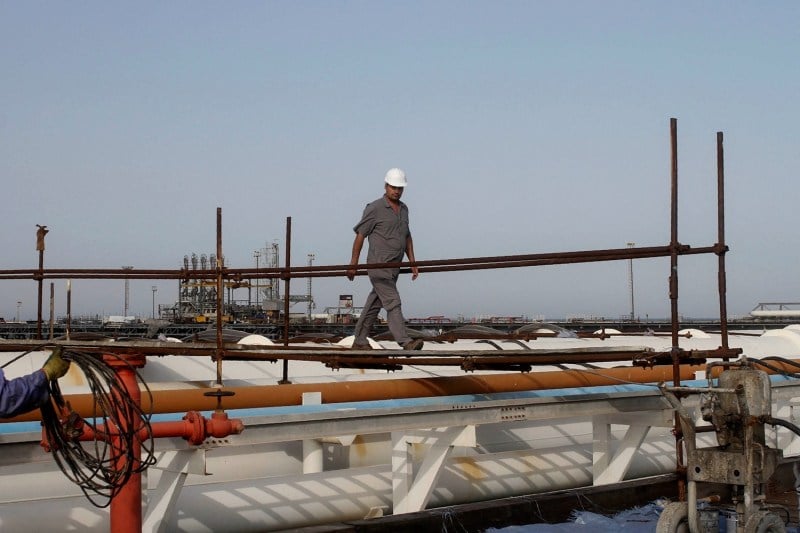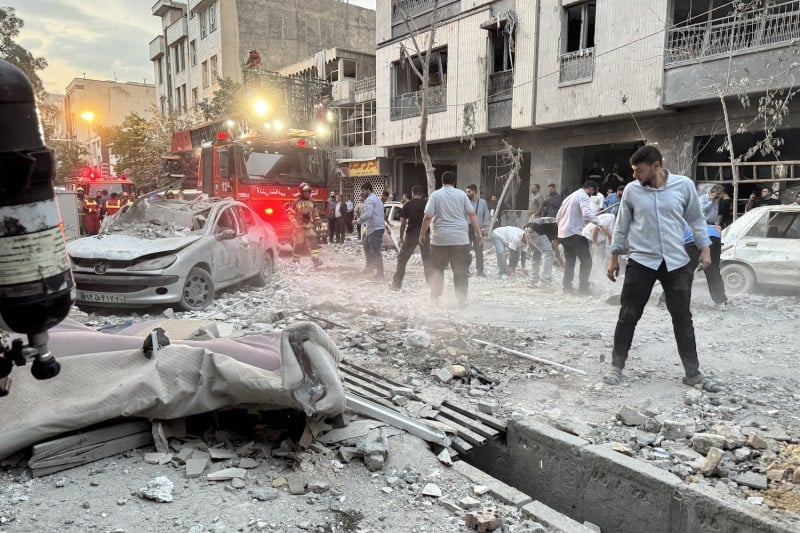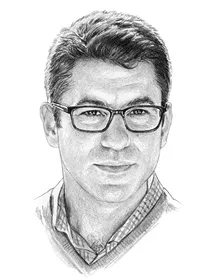Finland’s President: Trump’s Strategy ‘Is a Bit of a Seesaw.’

Finland’s President: Trump’s Strategy ‘Is a Bit of a Seesaw.’
Alexander Stubb on how Europe is managing growing tensions with the United States.
European leaders are rapidly coming to terms with the realization that U.S. President Donald Trump’s second term won’t be easy for them. Recent evidence includes a phone call between the leaders of the United States and Russia that was ostensibly about Ukraine but did not include Brussels or Kyiv; a statement by U.S. Defense Secretary Pete Hegseth that it was unlikely Ukraine would join NATO—words that could weaken Kyiv’s negotiating hand; and a speech by U.S. Vice President J.D. Vance at last weekend’s Munich Security Conference that barely mentioned Ukraine but questioned European values and commitment to democracy—a theme more likely to be heard in Moscow than Washington.
I got a chance to sit down and speak with Finnish President Alexander Stubb in Munich on Saturday, Feb. 15. After Russia invaded Ukraine in 2022, Finland abandoned decades of diplomatic neutrality to join NATO, the world’s biggest military alliance. In doing so, Finland immediately doubled the length of NATO’s boundaries with Russia. How is Finland managing that transition amid Europe’s increasingly tense relations with the United States? Subscribers can watch the full interview on the video box atop this page. What follows is a condensed and lightly edited transcript.
European leaders are rapidly coming to terms with the realization that U.S. President Donald Trump’s second term won’t be easy for them. Recent evidence includes a phone call between the leaders of the United States and Russia that was ostensibly about Ukraine but did not include Brussels or Kyiv; a statement by U.S. Defense Secretary Pete Hegseth that it was unlikely Ukraine would join NATO—words that could weaken Kyiv’s negotiating hand; and a speech by U.S. Vice President J.D. Vance at last weekend’s Munich Security Conference that barely mentioned Ukraine but questioned European values and commitment to democracy—a theme more likely to be heard in Moscow than Washington.
I got a chance to sit down and speak with Finnish President Alexander Stubb in Munich on Saturday, Feb. 15. After Russia invaded Ukraine in 2022, Finland abandoned decades of diplomatic neutrality to join NATO, the world’s biggest military alliance. In doing so, Finland immediately doubled the length of NATO’s boundaries with Russia. How is Finland managing that transition amid Europe’s increasingly tense relations with the United States? Subscribers can watch the full interview on the video box atop this page. What follows is a condensed and lightly edited transcript.
Ravi Agrawal: How worried are you about the fact that Presidents Trump and [Vladimir] Putin had a phone call, but nobody knows what they talked about?
Alexander Stubb: I’m worried but not alarmed. It is the beginning of a dialogue, but we’re far away. Personally, I do not think you can have peace without Ukraine or Europe. It’s good that President Trump is engaging with Putin, but the centerpiece should be [Ukrainian] President [Volodymyr] Zelensky.
RA: But what if they’ve made decisions that exclude European or Ukrainian leaders? What can Europe do about that?
AS: To be frank, they can’t make those decisions. Europe needs more skin in the game, which means they need a proposal.
There is a simple three-phase proposal. First, prepare negotiations by putting maximum pressure on Russia: more sanctions, freezing assets, and more military aid to Ukraine. Number two is the actual cease-fire demarcating a line. You need monitors to take care of it. And then only after that do you begin peace negotiations. Of course, you need confidence-building measures in between. But the bottom line is that there’s no way to decide European security over the heads of Europeans.
RA: How are you feeling about the Trump administration’s stance on resolving this conflict? In the handover period, the administration signaled that it did not want to lose in Ukraine—it did not want another Afghanistan debacle—which was interpreted in Europe as a positive sign. But things have changed in the last week or so, with the call between Trump and Putin, and [U.S.] Defense Secretary [Pete] Hegseth dismissing NATO membership or 2014 borders as likely outcomes for Ukraine.
AS: In many ways, the American strategy is a bit of a seesaw. So one day, Hegseth says no NATO membership, current borders, and no American backing. The next day, Vice President J.D. Vance puts pressure on Russia in a Wall Street Journal interview. So there’s a back and forth. We’re all struggling to put this in a broad perspective.
I see the window of opportunity for a cease-fire is three to six months. But peace negotiations will take much longer. And they must involve a broader range of players: Ukraine, Russia, the U.S., and Europe.
RA: I’m hearing you say that you see a throughline amid the seesawing. When you converse with American officials, many of whom are here in Munich, how different are they from what we hear in the news?
AS: I just met with 20 senators from foreign affairs and defense committees. The message was very clear. The backup for Ukraine is extremely strong. We need to keep that momentum going. We must understand that peace negotiations take a long time. This is not only about Ukraine’s independence, sovereignty, and territorial integrity, but also about a European security structure and even about the world order.
So the choice is between Yalta, which was a carve-up of big states, or the 1975 Helsinki Accords, which set up clear rules of what statehood means. We should not take Ukraine’s NATO membership off the table, because the truth is that a sovereign state can decide which membership to apply for, and then it’s up to that organization to approve or not. I think Ukraine’s EU membership is a given, and then NATO membership in the long run.
RA: The new administration is pressuring NATO members to increase defense spending as a percentage of GDP. Finland, for example, is around 2.4 percent of GDP. How do you get to 5 percent?
AS: First of all, you don’t fight wars with percentages. You fight them with military equipment and capabilities. Finland has obligatory military service. We have 900,000 men and women that have done it, including myself and my son. We have 280,000 reservists. We have 62 F-18s. We just bought 64 F-35s. We have long-range missiles for air, land, and sea. We have the biggest artillery in Europe, together with Poland. It’s not the percentage that matters. It’s the substance that matters. And I’m sure that will get there.
But the truth is, Donald Trump has been right from the beginning that Europe needs to take more care of its security and increase its defense expenditure. Remember, in 2014, there were only three NATO countries at 2 percent. Now there are 23. Donald Trump should be given credit for this.
RA: But as defense spending increases, spending will have to be reduced in other areas. What are those?
AS: Well, it’s not a zero-sum game. A lot of European leaders are looking for creative ways to finance defense. One example is coordinating orders instead of having 27 different orders. A second option is defense bonds to create mutual debt on defense. A third one is to allow the European Investment Bank to lend money for the defense industry. A fourth thing is to hike up European defense expenditure in the EU in the next multifinancial framework.
The Europeans understand that pressure is not just domestic, and not just from the U.S. You can’t have welfare without security, and you can’t have security without a strong defense.
RA: When you look beyond the noise of the Munich Security Conference, what is your sense of Finland’s priorities in Ukraine? What kind of realistic ideal scenario would you chart?
AS: For us, the war in Ukraine is existential. That’s why we are one of the biggest supporters and donors to Ukraine. We’re the fifth-largest donor. Why? Because it’s in our security interests and along our values. So, in an ideal world, Ukraine retains its independence, its sovereignty, and its territory.
RA: Those things may be unacceptable to Putin. What would you be willing to give up?
AS: I don’t think we should give up anything now. Maximize the pressure on Putin. Remember that the Russian economy is doing very poorly. We’re talking about real inflation at around 30 percent. We’re talking interest rates over 20 percent. It is hitting Russians.
This is a war of attrition. There’s no movement. The problem, of course, is that Putin and the Russians don’t seem to care for the loss of human life. Never underestimate the capacity of Russians to sustain discomfort.
RA: Russia would point out that it has transformed into a wartime economy. So Putin’s bet is they can sustain this for longer than the European or American public.
AS: Delusional. Their economy is in dire straits. When we get the cease-fire and the war ends and the war economy stops, there will be hundreds of thousands of Russians, including family members, who will lose their jobs. Putin’s maternity package, which pays for soldiers and dead soldiers, will end. I think unrest will come.
The difference between the European and the Russian economy will be as big as it was in 1991 when the Soviet Union collapsed. And then President Putin will have to ask himself whether it was the biggest strategic and tactical mistake in recent history. I think it was.
RA: A big topic at the Munich Security Conference was Vice President J.D. Vance’s speech. If I may paraphrase, he lectured the audience about democracy and free speech. He said that many European countries need to look within and accept that they are shutting down free speech. He cited Romania canceling its elections because of alleged Russian interference, for example. But many people also inferred that Vance was speaking in support of the German AfD [Alternative for Germany] party. I spoke to European leaders off the record who were absolutely gobsmacked by that speech. How did you feel?
AS: I’m a student of American politics. And the foundation of American democracy and free speech is very strong.
I can only speak for myself and my own country. Looking at something like the [Reporters Without Borders’] Free Speech Index, Norway is number one. Number two is Denmark. Number three is Sweden. Number four is the Netherlands. And number five is Finland.
I think that speech was more for a domestic audience than for a European audience. The good thing with free speech is that you can have different views. For me, free speech means responsibility. It means fact-checking. It means an open dialogue between different ideologies and identities. And if that is what Vice President J.D. Vance meant, it’s a good thing.
RA: I’m going to quote one former European foreign minister who told me that J.D. Vance in that speech did more for European integration since the founding fathers. Do you think that, walking away from that speech, Europe is looking now to try and go it alone in as many ways as it can?
AS: It’s important that we don’t over-rationalize the past, overdramatize the present, and therefore underestimate the future. My thinking is that the transatlantic alliance is sustainable and important. Right now, there is an ideological discrepancy. I cannot deny that. As far as European unity is concerned, that had already started in 2016 with Brexit, then COVID, then Russia’s attack on Ukraine. Because of energy, and because of increasing European defense.
We are seeing a relationship in flux, but a relationship which, at the end of the day, will be sustainable. Why? Because Europe needs the United States. But the United States, in order to be a superpower, needs allies. And the best allies come from Europe.
RA: What is the ideological discrepancy you referenced?
AS: There are cleavages between ideology—left and right—and also identity. They are inside the United States and they are inside Europe. You referenced the AfD. That was an ideological message to a political kin. We’ll see more of that in the future.
RA: Let’s talk about trade. Europe is very worried about Trump’s recent announcement about reciprocal tariffs. What can Europe do here?
AS: We have to engage in a dialogue with the United States. Trump is right on a trade deficit on goods. But we have to remember that trade is also about services. And there, of course, Europe has a deficit. So it’s six of one, and half a dozen of the other. We’re talking about a percentage difference in overall tariffs, which is quite small. The U.S. is very dependent on the European market, just as we are dependent on the U.S. market.
The big ideological problem I see with tariffs is that they’re trying to do a few things at once and therefore they fail. On one hand, they’re trying to send a tough domestic message and work as an intimidation or threat. Secondly, tariffs are a tax to bring in money, which is fine. In accounting terms, that might work. But then there’s the third thing, which is that at the end of the day, you may actually reduce the tariffs. So combining that with the threat, you can’t have your cake and eat it, too.
I find tariffs, especially if they’re not targeted, quite complicated. Most economists around the world agree. It’ll be interesting to see how the U.S. markets react to this. But again, Finns are cool, calm, and collected. We saw a threat of 25 percent tariffs to Mexico and Canada, and then suddenly a 30-day suspension. We see some targeted tariffs on China. So we’ll see. I understand from European leaders that if there are tariffs, they will be reciprocally met.
RA: You’re very diplomatic about how the United States is upending one of its closest relationships. What does that mean for Europe’s other relationships? Will flux in the United States move Finland, or Europe more generally, closer to China?
AS: You have to separate security, politics, and economics. Probably in economics and trade, if there are suddenly tariffs or other impediments to trade, Europe will start looking elsewhere. Of course, the EU is the biggest trader in the world. It has over 40 bilateral trade agreements with different countries and players. So instead of relying on the World Trade Organization (WTO) as a centerpiece of trade negotiations, trade goes elsewhere. That might happen in the long run.
But the biggest picture, especially for readers of Foreign Policy, I do think that we’re seeing a bigger change in the world order. This is the 1918, 1945, and 1989 moment of our generation. We can get it wrong, as the leaders did after World War I. The League of Nations wasn’t strong enough. We ended up in World War II. We can get it more or less right, as the world’s leaders did after World War II in establishing a multilateral system through the U.N., the World Bank, the IMF [International Monetary Fund] and, at the time, GATT [the General Agreement on Tariffs and Trade]. Or we can be intellectually lazy, as we were in 1989, assuming that history had ended and everyone would become a liberal democracy [and] rely on social market economies and globalization.
My big argument is that the global south will determine the tension between the global east and the global west. The key players will be the likes of India, Saudi Arabia, Nigeria, Kenya, South Africa, Argentina, Brazil, and Mexico.
We need to find a way to wade through, because I think multilateralism and cooperation is order. It’s rules, norms, and institutions. But multipolarity is transaction and disorder, and that’s what we need to avoid.
RA: Some would say we’re heading in that direction. Many of the WTO rules are being openly flouted in this moment.
But on the multilateral-versus-multipolar point, I find it striking that Secretary of State Marco Rubio has said in interviews that the unipolar moment might be over and that we’re entering a multipolar world. That could be music to the ears of the Chinese and the Indians. How do you respond to that?
AS: It depends on the type of multipolar world that we are creating. The Cold War was bipolar. The decade or so after the Cold War was America’s unipolar moment. But Fareed Zakaria was right in analyzing the post-American world, which would become multipolar. And now we’re seeing multipolarity on steroids. Of course, the theme of this [Munich Security] Conference is the world’s multipolarization. And the likes of India will prefer it if there are some rules around it. And that’s what we need to do.
For me, the big thing is to give power and agency to the global south. I find it mind-boggling that the U.N., which is supposed to maintain peace but is unfortunately failing, has on the Security Council no members from Latin America, from Africa, and only China from Asia. It’s time to reform that.
RA: But the old powers need to give up power, literally, for that to happen.
You’ve said that we want to avoid a transactional world, and yet, in many senses, it seems like we’re hurtling toward one. I’m going to come back to President Trump here. He is very clear that he is transactional and opportunistic, which he believes will serve American interests best. In recent weeks, the leaders who’ve shown up in the White House, like [Israeli Prime Minister Benjamin] Netanyahu and [Indian Prime Minister Narendra] Modi, have played a transactional game.
If everyone plays a transactional game and finds deals that work for them, doesn’t that contradict a rules-based order that benefits everyone?
AS: Not entirely; diplomacy in world politics is never black and white. But if it was a binary world, my preference would be to have strong multilateral institutions based on rules and norms where everyone would have agency, including the global south.
If we go into this Yalta-esque multipolar transactional world of disorder, then we’re going to start getting these unholy alliances. The consequence of that will be a regionalization of power. And in the regionalization of power, the United States loses its role as a global power. Europe will start looking inward. Africa will start looking inward. Asia will start looking inward. And that could be a segue to a reordering of the world, which I hope would be based on multipolarity. We have the institutions there, but they just need to be reformed. This is the stage where we are in world politics right now.
Diplomacy in world politics is never stagnant. Right now, the pendulum is swinging toward transaction. I would like to see it swinging toward more traditional cooperation.
Ravi Agrawal is the editor in chief of Foreign Policy. X: @RaviReports
More from Foreign Policy
-

A security guard stands at the entrance to the U.S. Agency for International Development (USAID) headquarters on Feb. 3. DOGE Is Hacking America
The U.S. government has experienced what may be the most consequential security breach in its history.
-

A man with a beard in a suit and tie speaks behind a teleprompter. The logo for MSC is behind him. Vance Leaves Europe Gobsmacked
U.S. Vice President J.D. Vance delivered a rebuke on immigration and alleged censorship to a shocked Munich Security Conference.
-

A Palestinian girl carries a child through the rubble of houses destroyed by Israeli bombardment in Gaza City on March 3, 2024. Why Is the World So Polarized on Gaza?
The answer might be linked to race and colonization, explains author Pankaj Mishra, speaking on FP Live.
-

An attendee dressed like Uncle Sam waits for Donald Trump to arrive for a campaign rally at the Mosack Group warehouse on September 25, 2024 in Mint Hill, North Carolina. America Is Its Own Worst Enemy
It’s not unprecedented for a powerful country to simply shoot itself in the foot.









Join the Conversation
Commenting on this and other recent articles is just one benefit of a Foreign Policy subscription.
Already a subscriber?
.
Subscribe
Subscribe
View Comments
Join the Conversation
Join the conversation on this and other recent Foreign Policy articles when you subscribe now.
Subscribe
Subscribe
Not your account?
View Comments
Join the Conversation
Please follow our comment guidelines, stay on topic, and be civil, courteous, and respectful of others’ beliefs.
Change your username |
Log out
Change your username:
CANCEL
Confirm your username to get started.
The default username below has been generated using the first name and last initial on your FP subscriber account. Usernames may be updated at any time and must not contain inappropriate or offensive language.